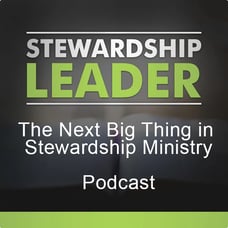 Our very own, Joe Park, recently sat down with Leo Sabo, President of the Christian Stewardship Network, to discuss why building a culture of generosity is essential for church ministry to thrive. In the podcast interview, The Next Big Thing in Stewardship Ministry, you’ll hear how generosity impacts the financial and spiritual well-being of your church.
Our very own, Joe Park, recently sat down with Leo Sabo, President of the Christian Stewardship Network, to discuss why building a culture of generosity is essential for church ministry to thrive. In the podcast interview, The Next Big Thing in Stewardship Ministry, you’ll hear how generosity impacts the financial and spiritual well-being of your church.
Creating a culture of generosity is an immense opportunity for all churches. If you haven’t already, check out Giving365, an on-demand library of generosity and stewardship resources built with church leaders in mind.
The Importance of Being Generous
The idea of being generous through every aspect of a living church is a powerful tool for funding ministry. In fact, developing a culture of generosity can lead to an increase in discipleship and engagement. The core reasons for it are simple. Generosity inspires people to rethink how they can use what they have been given—their time, money, influence, and opportunities—to be part of something bigger than themselves. The idea of generosity is more than just an uplifting and inspirational message; it’s a transformational way of life.
As a result, church leaders should foster cultures of generosity within their churches. Leaders should promote generosity as part of discipleship. But, above all, generosity involves creating a mindset of giving in all its forms. The very notion of generosity resonates with people, even those with limited to no church or spiritual history. Churches that have a culture of generosity often maximize their impact potential in ways previously unimaginable.
The Current State of Church Giving
During the podcast, Joe and Leo discussed the realities many churches face. As many church leaders know, a significant shift occurred. Since the late 1980s, church giving declined to about half of what it was before that time. However, total giving continues to grow, but it’s a bit of an illusion.
While Americans became wealthier and GDP grew, the reality is that giving remains at about two percent of peoples' income. In effect, we're no more generous than we've been during the last fifty years. Of course, this impacts churches, and many find themselves with less money to fund ministries.
Churches that are not intentional about building cultures of generosity are losing ground. As the world shifted to the information age, donors realized they wanted data on impact. Nonprofits turned toward communicating the impact, but churches have been slow to adapt. As a result, donors looking for measurable impact opportunities shifted their attention to the ministries and nonprofits that are doing this well.
Impact-Centered Giving for Communities
Unfortunately, many church leaders haven’t realized the seismic changes. Many behave as if things remain as they’ve always been. As a result, they hang onto an illusion that no longer exists. Church members and the public seek a positive path—despite the news. And for those where church giving continues to decline, an opportunity exists with generosity. In fact, every church has the chance to reimagine its future with generosity at the core.
As mentioned, people want to make a difference. The reality is that churches across the U.S. are uniquely positioned to create Kingdom impact. Church leaders who realize the benefits of creating cultures of generosity are positioning themselves to become the emotional and spiritual centers for their communities and members.
How to Talk About Generosity
Being generous is an idea church leaders should speak and teach about often. The concept provides the chance to show and share with members what it means to invest time, talent, and treasure in a way that results in measurable life change and impact. Being generous transcends age, gender, and experience. It asks every person to reimagine how they can use what they have to bring hope and light to others.
Learning to be generous is fundamental to discipleship. It’s important to note that it goes beyond speaking about generosity. Generosity should be woven into the fabric of all church ministries, especially your discipleship plan and pathway. If you’re curious about how to get started, check out an eCourse about the five disciplines of financially thriving churches.
The idea becomes a center point that will unite people, congregations, and communities. It invites everyone to join in sharing what they have to give. Moreover, it provides an opportunity for church members to see the impact they make, and that's a genuinely joyful experience.
One Life Can Change a Community
The most effective way to demonstrate the power of generosity is to focus on life change. Talk about how generosity changed the giver and the one who received the generosity of others. Change begins with one person, story, and life.
People remember the story of one person or family. It's far more effective and memorable to share one person's story. One of the reasons is people could often see themselves in one story.
Sharing one story at a time makes the concept easier to digest and increases the propensity to inspire others to grow in their generosity. Stories stay with people longer and have a greater chance to inspire the kind of transformation that only comes about as a result of generous living.
To learn more, listen to the full podcast on Apple Podcasts. Discover how you can take your generosity culture to the next level.

